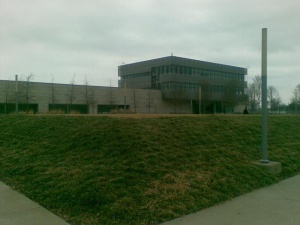Clinton Library Archives
The Clinton Library Archives are housed at the Clinton Presidential Center in Little Rock, Arkansas, and administered by 11 staff archivists from the National Archives and Records Administration. The archives include approximately 35,000 cubic feet of material. This material includes 77 million pages of documents, 1.8 million photographs, 88,000 rolls of film, 12,500 videotapes, and assorted electronic files. Also in the archives are 14,000 books from Clinton's personal library.
From November 2000 to January 2001 eight C-5 transport planes flew 625 tons of archival material from Washington, DC, to Little Rock. On January 20, 2001, the National Archives removed 177 computers used during the Clinton administration, copied their drives, and reformatted them for reuse by the Bush White House. NARA retained 40 million government-related email messages in its sweep of Clinton's offices and network servers. All physical documents and other memorabilia were stored temporarily at a defunct Oldsmobile dealership until the Library Archive building came online on July 28, 2004.
The windowless basement storage area is approximately half a football field long (10-15,000 square feet), with boxes stacked in compact shelving measuring eleven feet floor to ceiling. The area includes an additional 20,000 square feet of archival space. It is attached to the main exhibition space of the Clinton Library, but is not part of the so-called "bridge to the twenty-first century" main structure. Shortly before the Library groundbreaking Bill Clinton asked the two chief architects of the archives, James Polshek and Richard Olcott, to pull the two structures further away from each another as dictated in the original plan. "He was absolutely right," says Olcott. "Ordinarily you wouldn't make that big a change so late in the process. But when it's the president - well, of course." NPR reporter Alex Chadwick described the Clinton Library archives basement facilities as "like slightly smaller versions of the final shot from that first 'Indiana Jones' movie, the one where someone's wheeling away the lost Ark of the Covenant amid a maze of boxes."
Digital files will form the core of an online-accessible digital archive of Clinton-era primary material. The Clinton Electronic Records Project charged with creating the digital archive is directed by Sam Watkins. In 2004 the first collection of 20,000 searchable pages of public comments made by the president while in office became available on the Clinton Library website. Also available on the site in 2004 were 2,600 speeches, 2,400 press briefings, 467 radio addresses, and 380 photographs. The virtual library site is located at http://clinton6.nara.gov.
The first archivist of the Clinton Library Archives was David Alsobrook. He began operating the archives in November 2004 with thirty employees. In an interview before the Clinton Library opening he said, "What presidential libraries do, they remind all of us that we're not Republicans or Democrats; we're Americans all. And so in that sense, we are a unifying cultural aspect of the National Archives. At least I feel like that, and that's just my personal opinion."
In accordance with the provisions of the Presidential Records Act of 1978, Clinton administration documents were not generally available for the five years after Bill Clinton left office. In November 2001 President George W. Bush signed an executive order that allowed sitting presidents to deny release of the records of prior administrations regardless of the wishes of the president who generated the papers in the first place. This rule was strengthened by President Bush's Executive Order 13292 in March 2003. The order further restricts access to sensitive national security information in presidential papers. All presidential papers, excluding those of national security interest, become public in 2013, twelve years after Clinton left office.
On February 23, 2005, approximately 100,000 pages of Clinton administration domestic policy documents were made available to the public. The records included information on the President's initiatives in welfare reform, health care, education, employment, and the arts. The Library Archives also released material on the Commission on Holocaust Assets, which was set up to determine the distribution of assets of World War II victims in America following the war. On January 20, 2006, the Clinton Library Archives began receiving Freedom of Information (FOI) requests for presidential administration documents. Within twenty days the facility had received 74 such requests.
References
- "Access to Presidential Papers under Scrutiny," American Libraries, 35.10 (November 2004): 14.
- Alex Chadwick, "Profile: Taking a Tour of the New William J. Clinton Presidential Library with Archivist David Alsobrook," National Public Radio: Day to Day, November 17, 2004.
- "Clinton Documents To Be Made Public," New York Times, February 23, 2005.
- "Clinton Papers Release to be Bush's Decision," Washington Post, September 19, 2004.
- "Clinton to Release Papers Years Ahead of Schedule," American Libraries, 34.3 (March 2003): 11.
- Andrew DeMillo, "Bush, Clinton to Review Records Requests," Associated Press, February 7, 2006.
- Andrew DeMillo, "Clinton Library Collection Open to FOI Requests," Associated Press, January 19, 2006.
- Andrew DeMillo, "Clinton Library Prepares to Open Records to Researchers," Associated Press, January 20, 2006.
- Jennifer Lee, " Archiving Digital Records From the White House," New York Times, January 25, 2001.
- Cathleen McGuigan, "Bill's New Bridge," Newsweek, September 13, 2004.
- Caryn Rousseau, "Challenges Ahead as Clinton Library Celebrates First Year," Associated Press, November 18, 2005.
- Kevin Sack, "Pardon is Trouble for Clinton Library," New York Times, February 18, 2001.
- Jill Zeman, "Clinton Library Readies for Rush of Document Requests," Arkansas Democrat-Gazette, January 17, 2006.
